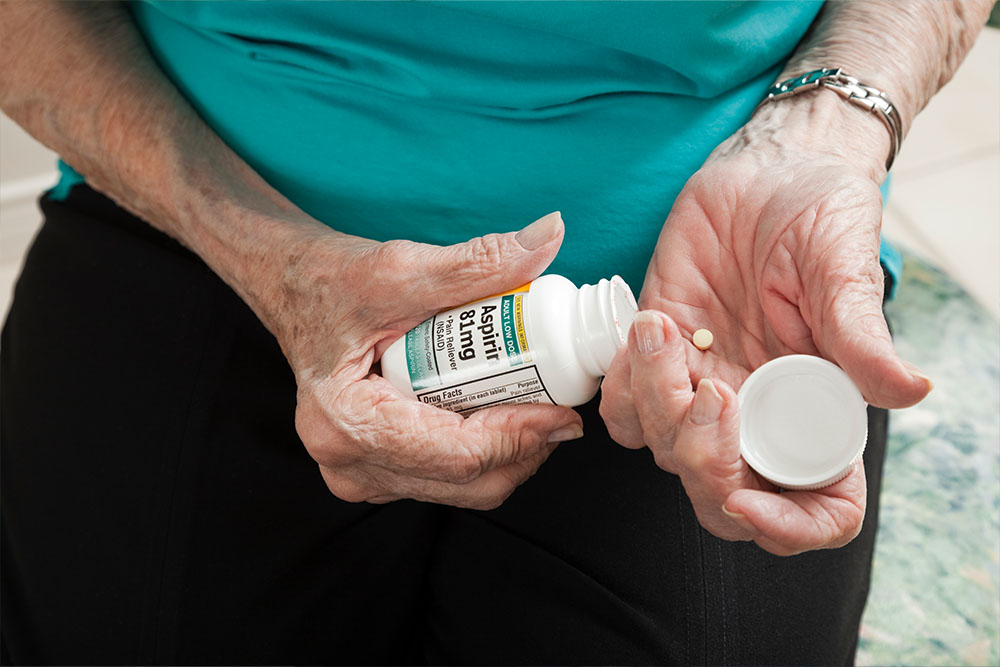Over-the-counter (OTC) painkillers offer short-term pain relief for common concerns such as toothaches, muscle stiffness, headaches, and arthritis pain. For many of these conditions, they can be as effective as prescription painkillers. It all depends on what you are taking them for — different types of OTC drugs work better with different kinds of pain.
Common OTC painkillers include nonsteroidal anti-inflammatory drugs (NSAIDs) like ibuprofen, naproxen and aspirin. Equally common are fever-relieving OTC painkillers like acetaminophen. Here’s what you need to know about these options.
Are NSAIDs effective pain relievers?
NSAIDs are the most commonly used OTCs. They include ibuprofen (Advil, Motrin), naproxen (Aleve) and aspirin (Bayer, Bufferin and Alka-Seltzer). These drugs relieve inflammation but don’t contain steroids.
Ibuprofen is short acting. Naproxen is long acting and more likely to cause an upset stomach. Both OTC drugs block communication between the cells involved in pain transmission and inflammation, thereby reducing both at the same time.
Many people with chronic pain can manage it without serious discomfort by taking NSAIDs. These OTC medications are especially effective at reducing painful swelling and inflammation.
NSAIDs can also relieve headaches, dental pain, period pain, muscle and joint pain, back pain, and bone pain. In fact, ibuprofen and naproxen can be more even more effective than opioid painkillers at relieving dental pain associated with abscessed gums.
On the other hand, researchers have found that opioid painkillers can delay wound healing or prevent wounds from healing altogether.
Furthermore, NSAIDs can help with the healing of fractures, sprains and ruptured tendons. In a recent article published at ABC Health & Well Being, Dr. Norman Swan explained that “one complication of hip replacement surgery is abnormal growth of bone around the joint. NSAIDs such as naproxen are good at inhibiting this bone growth.”
Naproxen (Aleve) and ibuprofen (Advil) are both available at higher doses, but they must be prescribed by your doctor. If an OTC NSAID isn’t helping, stop taking it and see your physician. You might need something stronger.
What about acetaminophen?
Also known as paracetamol, this OTC medication relives pain and reduces fever, but it doesn’t treat inflammation. That can be easily corrected by combining acetaminophen with an NSAID like ibuprofen or naproxen. Some formulations also contain caffeine.
What are the side effects of OTC painkillers?
When used properly, the side effects of OTC painkillers are mild or nonexistent. The most common side effect is upset stomach and indigestion. Serious side effects are unusual. They include gastrointestinal bleeding, ulcers, and gastritis.
People with alcohol abuse issues, chronic inflammatory bowel disease, liver disease or who are taking aspirin to prevent heart attack and stroke should avoid acetaminophen.
As with any medication, it’s best to take as little as possible only when needed for as long as needed. It’s easier to increase the dose later than to reduce it.
Acetaminophen is considered the safest OTC painkiller for long-term use because it’s thought to have fewer side effects than the other options. Nevertheless, people respond differently to different medications. If the first one doesn’t help, work with your doctor to find one that does.
A word on prescription painkillers
According to the National Institute on Drug Abuse, opioid prescription drugs like oxycodone, morphine and hydrocodone can “make people feel very relaxed and “high” – which is why they are sometimes used for non-medical reasons. This can be dangerous because opioids can be highly addictive, and overdoses and death are common.”
If you develop an opioid addiction, you will experience uncomfortable withdrawal symptoms and persistent cravings if you suddenly reduce or stop taking the drug. The longer you take opioid painkillers, the more likely you are to develop a habit.
If you want pain relief that’s not addictive, you can find it at your local pharmacy, and you won’t need a prescription to get it. Many OTC medications have been around forever and are safe and effective overall when used as directed.
As a Life Plan Community, The Moorings offers access to progressive levels of care, as and when you may need them — assisted living, rehabilitation therapies, memory care, and skilled nursing care. Contact us to find out more about our senior health services.



